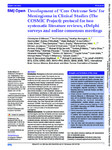Development of ‘Core Outcome Sets’ for Meningioma in Clinical Studies (The COSMIC Project): protocol for two systematic literature reviews, eDelphi surveys and online consensus meetings
| dc.contributor.author | Millward, CP | |
| dc.contributor.author | Armstrong, TS | |
| dc.contributor.author | Barrington, H | |
| dc.contributor.author | Bell, S | |
| dc.contributor.author | Brodbelt, AR | |
| dc.contributor.author | Bulbeck, H | |
| dc.contributor.author | Crofton, A | |
| dc.contributor.author | Dirven, L | |
| dc.contributor.author | Georgious, T | |
| dc.contributor.author | Grundy, PL | |
| dc.contributor.author | Islim, AI | |
| dc.contributor.author | Javadpour, M | |
| dc.contributor.author | Keshwara, SM | |
| dc.contributor.author | Koszdin, SD | |
| dc.contributor.author | Marson, AG | |
| dc.contributor.author | McDermott, MW | |
| dc.contributor.author | Meling, TR | |
| dc.contributor.author | Oliver, K | |
| dc.contributor.author | Plaha, P | |
| dc.contributor.author | Preusser, M | |
| dc.contributor.author | Santarius, T | |
| dc.contributor.author | Srikandarajah, N | |
| dc.contributor.author | Taphoorn, MJB | |
| dc.contributor.author | Turner, C | |
| dc.contributor.author | Watts, C | |
| dc.contributor.author | Weller, M | |
| dc.contributor.author | Williamson, PR | |
| dc.contributor.author | Zadeh, G | |
| dc.contributor.author | Zamanipoor Najafabadi, AH | |
| dc.contributor.author | Jenkinson, MD | |
| dc.date.accessioned | 2022-07-01T14:26:47Z | |
| dc.date.available | 2022-07-01T14:26:47Z | |
| dc.date.issued | 2022-05-09 | |
| dc.identifier.issn | 2044-6055 | |
| dc.identifier.issn | 2044-6055 | |
| dc.identifier.other | e057384 | |
| dc.identifier.uri | http://hdl.handle.net/10026.1/19375 | |
| dc.description.abstract |
<jats:sec><jats:title>Introduction</jats:title><jats:p>Meningioma is the most common primary intracranial tumour in adults. The majority are non-malignant, but a proportion behave more aggressively. Incidental/minimally symptomatic meningioma are often managed by serial imaging. Symptomatic meningioma, those that threaten neurovascular structures, or demonstrate radiological growth, are usually resected as first-line management strategy. For patients in poor clinical condition, or with inoperable, residual or recurrent disease, radiotherapy is often used as primary or adjuvant treatment. Effective pharmacotherapy treatments do not currently exist. There is heterogeneity in the outcomes measured and reported in meningioma clinical studies. Two ‘Core Outcome Sets’ (COS) will be developed: (COSMIC: Intervention) for use in meningioma clinical effectiveness trials and (COSMIC: Observation) for use in clinical studies of incidental/untreated meningioma.</jats:p></jats:sec><jats:sec><jats:title>Methods and analysis</jats:title><jats:p>Two systematic literature reviews and trial registry searches will identify outcomes measured and reported in published and ongoing (1) meningioma clinical effectiveness trials, and (2) clinical studies of incidental/untreated meningioma. Outcomes include those that are clinician reported, patient reported, caregiver reported and based on objective tests (eg, neurocognitive tests), as well as measures of progression and survival. Outcomes will be deduplicated and categorised to generate two long lists. The two long lists will be prioritised through two, two-round, international, modified eDelphi surveys including patients with meningioma, healthcare professionals, researchers and those in caring/supporting roles. The two final COS will be ratified through two 1-day online consensus meetings, with representation from all stakeholder groups.</jats:p></jats:sec><jats:sec><jats:title>Ethics and dissemination</jats:title><jats:p>Institutional review board (University of Liverpool) approval was obtained for the conduct of this study. Participant eConsent will be obtained prior to participation in the eDelphi surveys and consensus meetings. The two systematic literature reviews and two final COS will be published and freely available.</jats:p></jats:sec><jats:sec><jats:title>Trial registration number</jats:title><jats:p>COMET study ID 1508</jats:p></jats:sec> | |
| dc.format.extent | e057384-e057384 | |
| dc.format.medium | Electronic | |
| dc.language | en | |
| dc.language.iso | eng | |
| dc.publisher | BMJ Publishing Group | |
| dc.subject | clinical trial | |
| dc.subject | core outcome set | |
| dc.subject | meningioma | |
| dc.subject | Consensus | |
| dc.subject | Delphi Technique | |
| dc.subject | Humans | |
| dc.subject | Meningeal Neoplasms | |
| dc.subject | Meningioma | |
| dc.subject | Research Design | |
| dc.subject | Systematic Reviews as Topic | |
| dc.subject | Treatment Outcome | |
| dc.title | Development of ‘Core Outcome Sets’ for Meningioma in Clinical Studies (The COSMIC Project): protocol for two systematic literature reviews, eDelphi surveys and online consensus meetings | |
| dc.type | journal-article | |
| dc.type | Journal Article | |
| dc.type | Research Support, Non-U.S. Gov't | |
| plymouth.author-url | https://www.ncbi.nlm.nih.gov/pubmed/35534067 | |
| plymouth.issue | 5 | |
| plymouth.volume | 12 | |
| plymouth.publication-status | Published | |
| plymouth.journal | BMJ Open | |
| dc.identifier.doi | 10.1136/bmjopen-2021-057384 | |
| plymouth.organisational-group | /Plymouth | |
| plymouth.organisational-group | /Plymouth/Faculty of Health | |
| plymouth.organisational-group | /Plymouth/Faculty of Health/Peninsula Medical School | |
| plymouth.organisational-group | /Plymouth/REF 2021 Researchers by UoA | |
| plymouth.organisational-group | /Plymouth/REF 2021 Researchers by UoA/UoA01 Clinical Medicine | |
| plymouth.organisational-group | /Plymouth/Research Groups | |
| plymouth.organisational-group | /Plymouth/Research Groups/Institute of Translational and Stratified Medicine (ITSMED) | |
| plymouth.organisational-group | /Plymouth/Research Groups/Institute of Translational and Stratified Medicine (ITSMED)/CBR | |
| plymouth.organisational-group | /Plymouth/Users by role | |
| plymouth.organisational-group | /Plymouth/Users by role/Academics | |
| plymouth.organisational-group | /Plymouth/Users by role/Researchers in ResearchFish submission | |
| dc.publisher.place | England | |
| dcterms.dateAccepted | 2022-04-07 | |
| dc.rights.embargodate | 2022-7-2 | |
| dc.identifier.eissn | 2044-6055 | |
| dc.rights.embargoperiod | Not known | |
| rioxxterms.versionofrecord | 10.1136/bmjopen-2021-057384 | |
| rioxxterms.licenseref.uri | http://www.rioxx.net/licenses/all-rights-reserved | |
| rioxxterms.type | Journal Article/Review |


